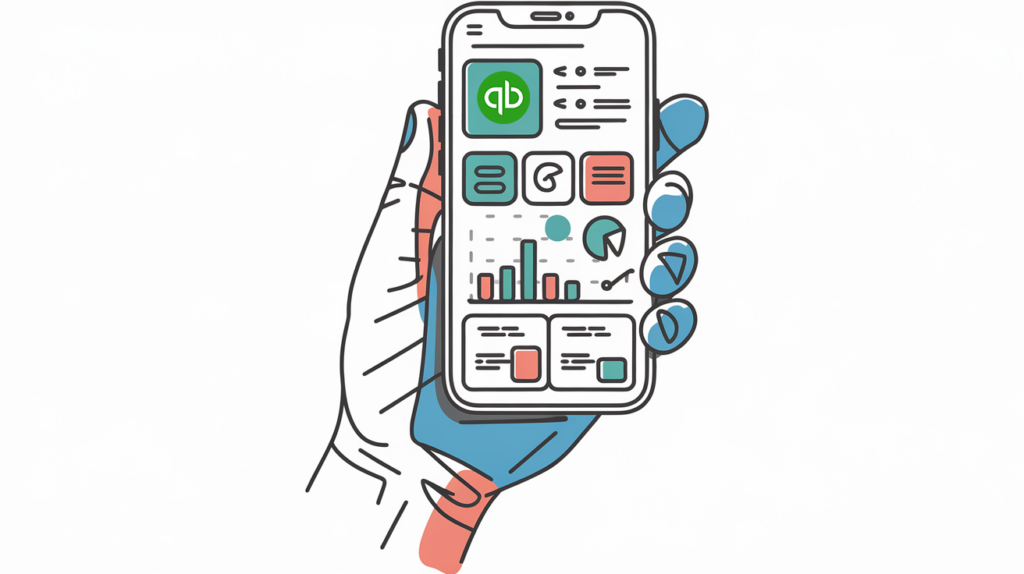Effective financial management is crucial for startups aiming for sustainable growth. With a plethora of accounting and bookkeeping software available, selecting the right one can be overwhelming. This comprehensive guide explores the top software solutions tailored for startups in 2024, highlighting their key features, pros and cons, and comparisons.
Top Accounting Software for Startups in 2024
Navigating the world of accounting software can be daunting for startups. Here’s a breakdown of leading options that cater to different business needs:
1. QuickBooks Online

Overview: Widely regarded as a leading accounting software for small businesses, QuickBooks Online offers a comprehensive suite of features suitable for various startups.
- Key Features:
- User-friendly interface with extensive customization options.
- Automated bank feeds and expense tracking.
- Robust reporting capabilities with customizable templates.
- Integration with over 700 third-party applications.
- Pros: Excellent integration with other business tools; scalable for growing businesses.
- Cons: Can be more expensive compared to some alternatives.
2. Xero

Overview: Known for its user-friendly interface, Xero is an excellent choice for startups seeking ease of use and robust features.
- Key Features:
- Strong cash flow management tools.
- Integration with over 800 third-party applications.
- Multi-currency support and project tracking capabilities.
- Pros: Minimal learning curve; effective mobile app.
- Cons: Limited customer support options.
3. FreshBooks
Overview: Ideal for service-based businesses, FreshBooks combines invoicing with comprehensive accounting features.
- Key Features:
- Easy-to-use invoicing and billing system.
- Time tracking and expense management functionalities.
- Strong reporting tools tailored for small businesses.
- Pros: Excellent user experience, particularly for freelancers and small teams.
- Cons: May lack advanced features needed by larger organizations.
4. Zoho Books
Overview: A cost-effective solution that excels in automation and integration capabilities.
- Key Features:
- Automated invoicing and expense tracking.
- Seamless integration with various business applications.
- Comprehensive reporting features.
- Pros: Affordable pricing starting at $15/user/month; suitable for startups looking to streamline processes.
- Cons: Limited advanced features compared to competitors like QuickBooks.
5. Wave Accounting
Overview: A free accounting software option perfect for startups on a budget.
- Key Features:
- Basic accounting functionalities including invoicing and receipt scanning.
- User-friendly interface designed for non-accountants.
- Pros: Core features are completely free; good for very small businesses or freelancers.
- Cons: Limited advanced features such as inventory management.
6. Sage Intacct
Overview: A robust solution tailored for growing businesses needing advanced financial management tools.
- Key Features:
- Strong financial reporting and analytics capabilities.
- Project accounting and multi-entity management features.
- Pros: Highly customizable; ideal for businesses anticipating rapid growth.
- Cons: Higher price point may not suit all startups.
Comparison Table of Top Accounting Software
| Software | Key Features | Pricing (as of 2024) | Maximum Users | Time Tracking | Inventory Tracking | Phone Support |
|---|---|---|---|---|---|---|
| QuickBooks Online |
|
|
Up to 25 in Advanced plan | Manual entry in Essentials plan and higher; automatic tracking costs extra | Yes, in Plus plan and higher | Yes, available seven days a week |
| Xero |
|
|
Unlimited | Yes, in Established plan | Yes | Rep will call if necessary |
| Zoho Books |
|
|
Up to 15 in Ultimate plan | Yes, in paid plans | Yes, with Zoho Inventory integration | Yes, weekdays in paid plans |
| FreshBooks |
|
|
Up to two in Select plan | Yes | Yes | Yes, available weekdays |
| Wave |
|
Free (fees for online payments and payroll services) | Unlimited | No | No | No live support unless subscribed to a paid Wave product |
| Sage 50 |
|
|
Up to 40 in Quantum Accounting plan | No | Yes | Yes, available weekdays |
| QuickBooks Enterprise |
|
Varies based on plan | Up to 40; each user license costs extra | Yes, in Diamond plan (fees apply) | Yes | Yes, available 24/7 |
| Kashoo |
|
|
Not specified | Not specified | Not specified | Phone support available |
| Patriot Software |
|
|
Not specified | Time & Attendance add-on available | Not specified | Available weekdays |
| GoDaddy Bookkeeping |
|
|
Unlimited | No | No | No |
Why Your Startup Needs Accounting and Bookkeeping Software
In the past, managing finances involved sifting through piles of paperwork, leading to inefficiencies and errors. Today, accounting software revolutionizes this process by automating financial tasks, reducing manual data entry, and minimizing errors. It helps in timely bill payments, sending invoices, and keeping accounts organized. Moreover, it ensures compliance with financial regulations, helping you avoid tax issues. Modern software is designed to be user-friendly, making financial management accessible even without an accounting background.
What to Look For in Accounting and Bookkeeping Software
When searching for accounting and bookkeeping software for your startup, consider these factors:
1. Ease of Use
The software should have an intuitive interface that is easy to navigate. A steep learning curve can lead to increased training costs and resistance from staff.
2. Industry-Specific Features
Certain industries have unique accounting requirements. Look for software that caters to the specific needs of your industry, such as construction, retail, or non-profit.
3. Integration Capabilities
Check if the software can integrate with other systems you use, such as CRM, e-commerce platforms, payroll, or banking software. Seamless integration is crucial for streamlining processes.
4. Scalability
The software should grow with your business, supporting additional users, more complex operations, and increased transaction volumes as you expand.
5. Pricing
Consider both upfront costs and ongoing expenses. Be aware of additional costs for updates, add-ons, or extra features.
6. Cloud-Based or On-Premises
Decide between cloud-based solutions, which offer convenience and lower upfront costs, and on-premises solutions, which provide more control over data security and storage.
7. Multi-Currency and Multi-Language Support
If your startup operates internationally, look for software that supports multiple currencies and languages.
8. Tax Preparation and Filing
Software that assists with tax calculations, preparation, and electronic filing can be extremely valuable, especially without a dedicated tax professional.
9. User Reviews and Feedback
Research reviews and feedback from other users, especially those in similar industries or business sizes, to gauge the software’s performance and reliability.
Best Accounting and Bookkeeping Software in 2024
Based on the factors discussed, the following are some of the best accounting and bookkeeping software options for startups in 2024:
- QuickBooks Online: Ideal for scalability and integration capabilities.
- Xero: Known for its user-friendly interface and strong features.
- Zoho Books: Offers affordability and automation.
- FreshBooks: Best for service-based businesses and freelancers.
- Wave: Perfect for startups on a budget, offering free core features.
Related Articles:
Frequently Asked Questions (FAQ)
1. What is the difference between accounting and bookkeeping software?
Accounting software offers a broader range of financial management features, including budgeting, forecasting, and financial reporting. Bookkeeping software focuses more on recording financial transactions like sales, purchases, receipts, and payments.
2. Is cloud-based accounting and bookkeeping software secure?
Yes, reputable cloud-based accounting and bookkeeping software employ advanced security features such as encryption, multi-factor authentication, and regular security audits. It is essential to choose a reliable provider that follows industry-standard security practices.
3. How does accounting and bookkeeping software help with tax preparation?
The software organizes financial data and transactions systematically, automatically categorizing expenses and revenues. This makes it easier to determine deductible expenses and taxable income. Many systems offer tools for calculating tax liabilities, generating tax reports, and some even allow filing returns directly from the software.
4. Can I access my accounting and bookkeeping software on mobile devices?
Yes, many modern accounting and bookkeeping software offer mobile apps or mobile-friendly versions, allowing users to access financial data from smartphones or tablets. This enables business owners and accountants to manage finances, create invoices, track expenses, and view reports on the go.
5. How long does it take to set up accounting and bookkeeping software?
The setup time varies depending on the complexity of the software and your business needs. Simple, cloud-based solutions can often be set up within a few hours or days. More complex systems requiring customization or integration might take weeks or months. Having all necessary financial information ready and seeking assistance from the provider can expedite the process.
Conclusion
Choosing the right accounting and bookkeeping software is a pivotal decision for startups aiming to streamline financial management and support sustainable growth. In 2024, options like QuickBooks Online, Xero, FreshBooks, Zoho Books, and Wave offer valuable features tailored to different business needs and budgets.
Consider factors such as ease of use, integration capabilities, scalability, pricing, and industry-specific requirements when selecting the software that best fits your startup. Owning your bookkeeping data and ensuring seamless integrations with other business systems can significantly enhance your financial management processes.
By leveraging the right accounting software, startups can maintain accurate financial records, make informed decisions, and position themselves for growth and success in a competitive market.




 anywhere
anywhere  anytime
anytime